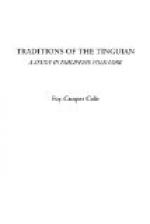Not long after Aponibolinayen could sit up straight, and she wanted to leave Algaba, but he took her. When Aponibolinayen looked at her ring she saw it was not her own. “Why have I another ring?” she asked, and she caught the hand of Algaba for he wanted to take her. “Give me my ring. It is not good for you, for it looks like copper. Take your ring, for it is really gold,” said Aponibolinayen. “No, this is good, for I did not take it from your finger. The spirits wanted it to come to my finger. Our rings are both gold, but they are different colors,” he said. “Let us chew betel-nut for it is bad for us to talk when we do not know each other’s names.” “It is not my custom to chew betel-nut,” said Aponibolinayen. “Then you learn,” said Algaba. Not long after he made her chew and he gave to her. “Now, lady, whom I visit you tell your name first,” he said. “No, because I am ashamed, as a woman to tell my name first.” Not long after he said, “My name is Algaba of Dagala. I have looked in all parts of the world for a wife, but I did not find anyone like you, and now I have found you, and I want you to be married to me.” “My name is Aponibolinayen of Kaodanan, sister of Aponibalagen who are son and daughter of Ebang and Pagbokasan,” said Aponibolinayen. Not long after they laid down their quids and they were rows of agate beads which have no holes. Algaba said, “It is good for us to be married.” So they were married and they went to Dagala. As soon as they arrived in Dagala, “Mother,” he said to his mother alan, “now we are going to take you to Kadalayapan, because I have found a wife.” “No,” said the alan, “we must first build balaua here.” “That is good if it is what you desire,” said Algaba.
Not long after Aponibolinayen commanded people to pound rice, and others to get betel-nuts which were covered with gold. So they truly made Sayang. [120] Not long after when it became evening they made Libon. “The best for us to do is to invite Aponibalagen, and all the people of Kadalayapan and some other places,” said Algaba. Not long after they sent the betel-nuts which were covered with gold to invite their relatives. Some of the betel-nuts they sent to Kaodanan. “Sir, come to Dagala, because Aponibolinayen and Algaba build balaua,” said the betel-nut to Aponibalagen. When the other betel-nuts arrived at Kadalayapan to invite the people they said to Langa-an, “Come to Dagala because Aponibolinayen and Algaba make balaua.” Not long after Aponibalagen and Aponigawani and the other people went.




